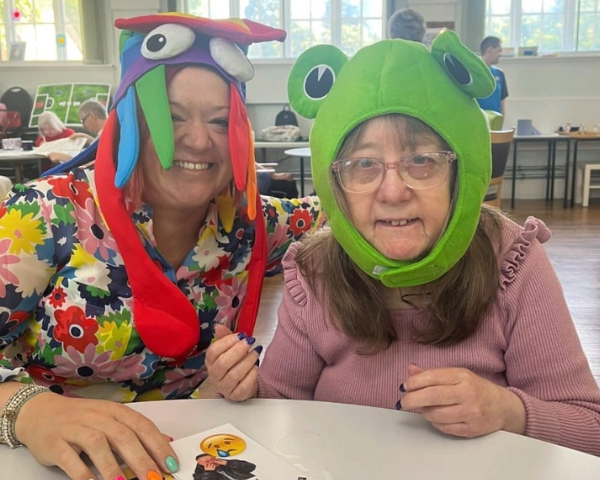Helping People with Learning Disabilities Talk about death
During our Dying to Talk Project, the team learned that talking about death is hard for anyone, but it can be even more difficult for people with learning disabilities. Thanks to donations from Marie Curie, we were able to create a special session where people with a learning disability and autistic people could learn about death and share their feelings in a safe, supportive space.
We're delighted to show what we've been up to and how it has helped.
Why is it important to talk about Death?
Death is a part of life, but it’s something a lot of people avoid talking about—especially with people who have learning disabilities and/or are autistic, but of course we all experience loss and grief and need a way to understand and process these feelings.
We have been contacted by organisations to help support people with learning disabilities to open up and talk about death and dying, by running similar workshops as MacIntyre. The Health team wanted to share our approach to encourage and support others. We hope this blog helps inspire others to run similar workshops to support people to talk about death and dying.
Planning the Session
During the session we wanted people to feel safe and in control so we used the following:-
• Pictures: clear pictures to explain things like death and grief to make the ideas easier to understand. We created our living well / dying well cards to support learning styles
• Emotion Cards to consider feelings throughout the workshop and allow for reflection
• Easy read documents for recording death and dying preferences
• A calm, welcoming space where people could take their time.
• Extra support available to offer one-on-one support when needed.
• Creative approach: Instead of just talking, we included activities like a hat game, drawing, and storytelling to give people different ways to express their feelings.

The workshop:
When the day came, we welcomed a group of people, each with their own experiences and feelings. The workshop was open and relaxed, which helped create a space where people felt comfortable sharing. We started the session with a hat game, where people shared what they knew about death and how they felt about it. We talked about the loss of pets and people. A person shared a memory of a family member who had died, saying, “I miss them, but talking about it helps.”
We drew pictures, made collages, and wrote poems to express feelings about loss, which gave the group a chance to work through their emotions in their own way. We used the emotion cards for those who needed extra support and prompting to tell us what they might be feeling. Throughout the session, we made sure to answer any questions clearly and with care.
The session plan:
The Health team have created a session plan and this is a detailed outline for running a Loss and Bereavement workshop. This is what the session plan covers
- Aim and objectives of the session
- Equality, Diversity & Differentiation Statement:
- Learning Objectives:
- Materials/Resources Needed:
- Main Activities/Content for the facilitator:
- Main Activities/Content for the participant:
- Timing:
- Methods/Approaches:
- Assessment/Feedback:
The main purpose of this session plan is to ensure structure and organisation as It helps the facilitator stay organised and ensures that all the necessary content is covered within the available time. It ensures the session remains focused on achieving the learning objectives. While it’s structured, it allows for some flexibility to adapt to the needs of participants throughout the workshop. Click here to view the session plan.
The Impact:
The workshop was an unusual workshop for many of the people that took part. The workshop is all about choice and control and empowerment and it took a while for people to feel safe and it was okay to share whilst not feel pressured to contribute if they didn't want.
People said they felt relieved to talk openly about death, a topic they don’t often get to discuss. The creative activities helped people express their feelings, and by the end, many felt more at peace and more comfortable to talk about their personal experiences.
How Donations Made It Possible:
The quality of resources and time spent creating the lesson was made easier by the generous donation from Marie Curie. Thanks to Marie Curie's support, we were able to create the space needed and a really meaningful session.
What next?
The Health team are always reflecting and it was understood how important this workshop was, and future ones are needed. We need to provide spaces where people with learning disabilities can talk about difficult topics like death and dying, and loss and bereavement. We’re committed to keep this work going, making sure that more people across MacIntyre and also the wider community have the support they need in a way that makes sense to them.
